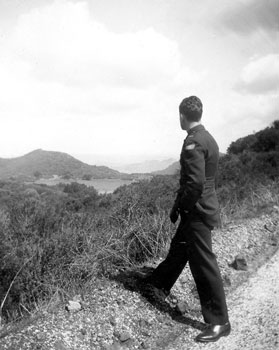 October 1945...And now what...?
October 1945...And now what...?In early August, having completed Primary, our class barracked for a few days in a base outside Bakersfield. We had to put up with the oppressive summer heat of California's Great Valley while we awaited assignment to the next step in pilot training. However, in early August events in the Far East determined our future. Atomic bombs exploded over Hiroshima and Nagasaki. Russian armies moved against the Japanese in Manchuria. At first, I didn't fully appreciate what these events meant, but it appeared that the Pacific war might soon be over. Nevertheless, orders were handed me to report to Stewart Field in Newburg, New York; so on August 12th I boarded a cross-country train.
V-J Day
The train carrying me from Los Angeles to New York City was the Super Chief. This was an upscale train in which I had for the first time my own compartment, small but comfortable and private. I had only to walk to the last car to find company and refreshments. This was a lounge with large viewing windows and a bar which served drinks and sandwiches. On August 14th, as I was about to order a beer and ham sandwich, the bar suddenly closed and all passengers were shooed out the door. President Truman had just announced the Japanese surrender. The conductor wanted no whoopees in his club car. So I celebrated VJ Day quietly in the privacy of my little compartment.
Stewart Field, New York
Stewart Field was "old army". It was the airfield for the nearby West Point Military Academy, and the maturity and prestige of that institution were reflected here. My accommodations seemed luxurious. I had a private room in the BOQ (bachelor officers' quarters). This was a solid masonry building instead of the clapboard-and-tarpaper barracks thrown up at other wartime bases. And the mess hall offered better food than Newburg's restaurants.
A few days after reporting in, all the newcomers in the pilot-training class lined up at headquarters. To continue our training we had to sign up for three more years of service. I opted out. I'd thought about this decision on the long train ride east. The Air Force had treated me well as a navigator. In time I might prove myself as a pilot. But though I would greatly miss the flying, I knew I was more civilian than soldier. Nevertheless, having chosen another path, I've wondered what my life would have been like in a post-war Air Force.
Owing to the Eighth Air Force's generous awarding of medals and battle stars, I had enough points in the army's downsizing system to qualify for immediate discharge. In the stateside army, however, few things happened immediately. While waiting for papers to be shuffled and signed, I kept flying as a navigator-observer. My first flight was to look for a missing Navy plane. Others found the fighter wrecked in the hills of northern New Jersey. On this flight I briefly handled the controls of an AT-6 "Texan", which served as the trainer in Basic Pilot School. This two-seated, low-winged, high-powered plane seemed awesomely big and complicated to me. At Stewart, too, I had my first flights in a B-25, "Mitchell", the plane that carried Doolittle and his raiders to Japan, our first offensive air action in the Pacific.
Weeks passed with few duties other than reporting for orders every morning. The diversions of New York city were sampled—Times Square to the Metropolitan Opera House. I cashed War Bonds to buy a six-year-old, Ford-V8 sedan. In the afternoons I drove my "new" car around upstate New York. In the evenings I read or played cards with others awaiting orders.
To Los Angeles
In early October the proper stencils rolled through the mimeograph machine directing me to the Newark, New Jersey Separation Base. Then, with discharge papers happily in hand I set out on the long drive west. Near Wheeling, West Virginia, one of my retread tires fell apart. I had to stay over a day to get a Ration Board's permission to buy another tire. The two-lane roads that were the U.S. highways of the time were crowded. Everybody was going home. From Tulsa I followed Route 66 for hundreds of miles to Flagstaff, Arizona. Not a bed was to be had in the town. I drove on through the night and the next day to Los Angeles. Before the end of October I was enrolled at U.C.L.A., to begin studying how to study the earth.
 October 1945...And now what...?
October 1945...And now what...?Back to Navigating Through World War II Home Page